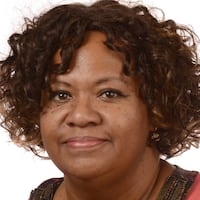Donald Rene remembers April 20, 1999 very well. Like most school police officers, he prays that the shootings at Columbine High School in Colorado on that date are never copied at his school. He and many like him say that incident changed the dynamics of school safety forever.
When he first started working in schools, administrators didn’t want officers looking like police.
“We had to wear sports jackets,” said Rene, who has been with the Fulton County Schools Police Department for 22 years. “They didn’t even want us to carry our sidearm.”
The compromise was to conceal the weapon.
“But once people saw that violent school crime wasn’t limited to inner cities and that middle- and upper-class students in the suburbs are probably more at risk for this kind of thing, the mindset of school policing changed.”
As an AJC reporter and photographer shadowed Rene on his daily roundshe explained the evolution of school policing.
Walking the halls of Riverwood International Charter School, Rene’s main mission is keeping the students and staff safe. But doing that well involves more than a gun and a badge, he said.
“Not everyone can do this job,” said Rene, a former Atlanta Police Department officer. “You have to wear many hats, and just one of them is law enforcement.”
A school police officer (Fulton County doesn’t use the common term “school resource officer”) has to be many things: security officer, confidant, teacher’s aide and mentor.
“I used to say I’ve done everything at the school except grade tests and serve lunch, but the (big snowstorm of 2013) had me feeding kids who couldn’t get home.”
As in the Food Network show, “Chopped,” he gathered foodstuffs from the kitchen to make dinner for about 250 children as well as staff, parents and people in the community who came to the school for refuge.
With another officer, three or four administrators and a few teachers who volunteered to stay until kids were picked up, Rene had to make sure the students were kept separate from the people who’d wandered in from the cold.
“Even in a situation like that, I can’t lose sight of my main duty,” he said. “I didn’t know who these people were and letting down my guard could have been detrimental.”
An imposing figure at six-foot-five and 235 pounds, Rene said he’s not at the school to be a glorified hall monitor.
“Once you understand the job, it’s not hard to keep the school administration duties separate from your role as an officer.”
He doesn't hunt down students who are skipping class. If he notices the same kid has been wandering the halls for two periods, he might ask if that student's supposed to be somewhere. And he doesn't get involved with school fights unless it's huge melee or weapons come out or it results in serious injury. The school officer is still a law enforcement official.
But policing at a school isn’t the same as on the street.
“Whereas an officer on street patrol may encounter some of the same people occasionally, I see these kids 180 days a year,” Rene said. “It’s a different kind of dynamic and I’m not here to be intimidating.”
Smiles and fist-bumps from students, claps on the back from teachers and quick conversations from parents visiting the campus were testament to Rene’s popularity.
“I want everyone to know that they can come to me with anything,” he said. “A lot of times people feel that they have nowhere to turn and they do desperate things.”
He said the public would find some acts of violence that are planned, but thwarted just as incredible as those incidents that make headlines.
Knowing how to keep a clear head, focus on the situation and talk the students through the rough spots comes from training, experience and building a rapport with the Riverwood family.
“Basically, they are all good kids,” said Rene. “You have to keep in mind that they are kids and in general are looking for guidance even if they don’t know it.”
Rene stopped in Mary Schmidt’s classroom and gave a greeting in Spanish. Her students aren’t native English speakers, and Rene’s fluence in Spanish and French have proven helpful.
“He calls out BINGO for us,” she beamed. “He’s an absolute gem!”
Most immigrant students have learned to fear police, and that can lead to trouble, said Rene. He tries to relate to them on their level in their language while maintaining his status as an authority figure.
As the tour continued, Rene had to take out keys to unlock building after building. The campus is undergoing renovation. A building is being built that will house the gymnasium and cafeteria next year. Over the summer an old building will be torn down and then next year a new one will be built in its place.
But at the end of the day, Rene concedes he’s just one man, who relies heavily on the students, staff and community.
“My relationships have given me unlimited eyes and ears. Any good school police officer will tell you the same thing,” he said. “And although social media gets a bad rap, it’s a blessing and a curse. Some of my best tips come from the kids sharing anything with just about everyone.”
When asked if he’d trade the uniform for another career, Rene quickly said he gets the best of all worlds.
“I enjoy being around kids. I used to coach basketball and I like to mentor them and help see them succeed,” he said. “Building respect and trust is a sure-fire way to build great citizens.”
About the Author
Keep Reading
The Latest
Featured


